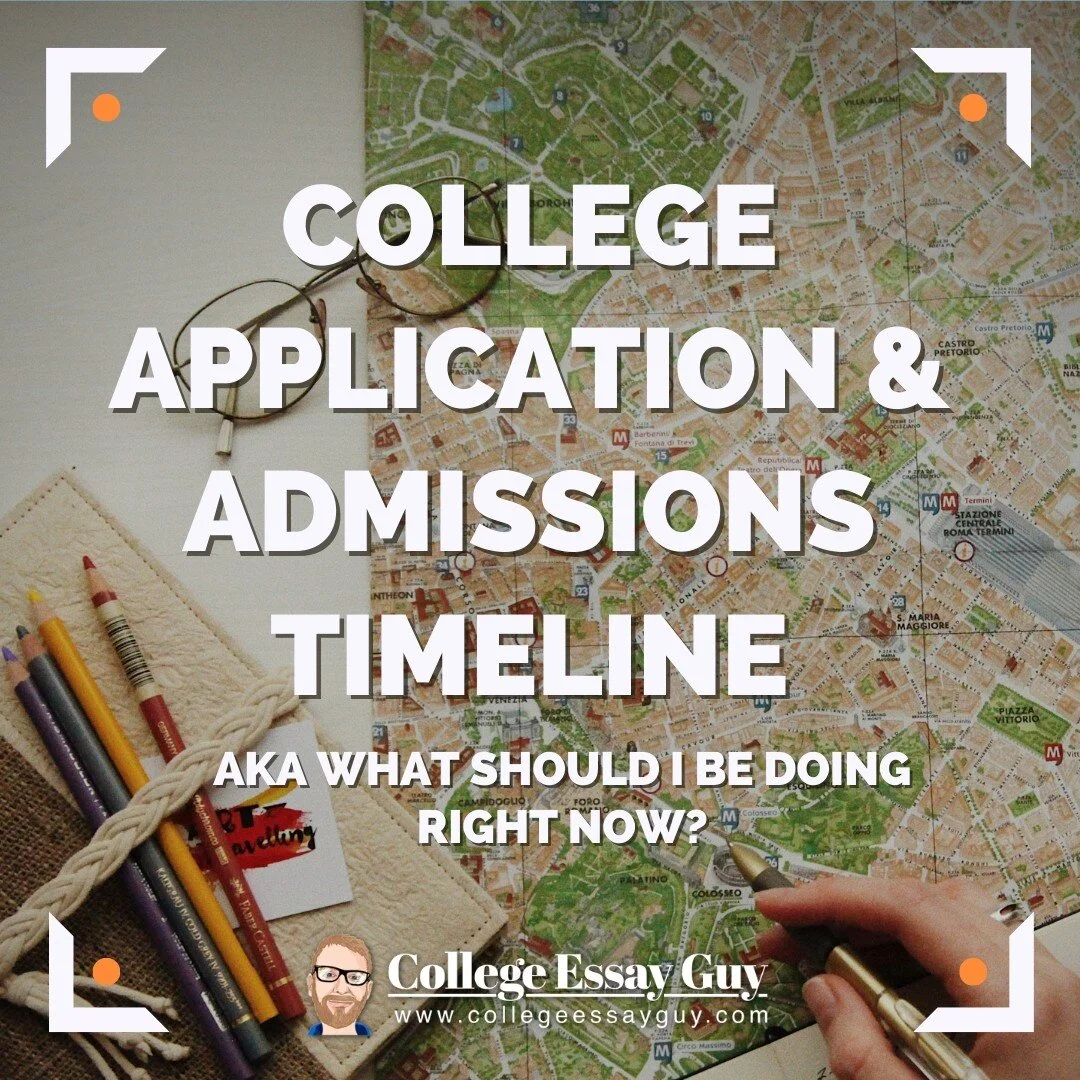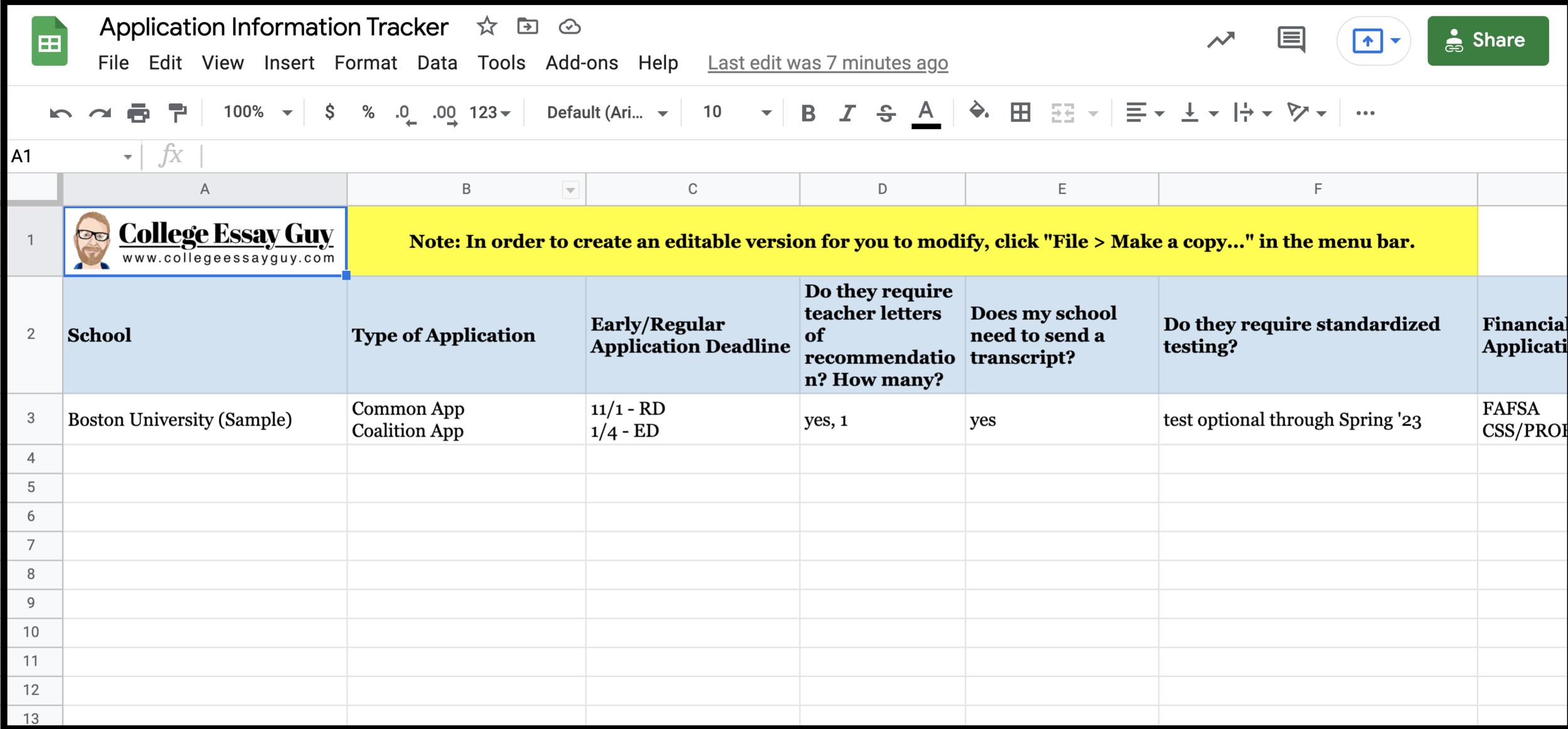Big thanks to Stacy Hernandez and the folks who contributed to this timeline
This college admissions timeline tells you what tasks to prioritize each year of high school in order to prepare for college.
Inside, you’ll find tons of resources for finding out how long the admissions process takes, when you should begin preparing (hint hint, now), and even when to take those pesky standardized tests.
Click here to download our simple college application information tracker
9th grade Timeline
Do the Values Exercise to determine what’s important to you.
Take a strengths assessment (you can take the VIA Strengths Assessment, and many other questionnaires, through UPenn’s Authentic Happiness site—you’ll have to create login credentials) and try a personality inventory (personality psychologists generally use either the HEXACO or the Big 5) to learn more about your strengths, challenges, and communication and learning style.
Take a personality assessment to learn more about your strengths, challenges, and communication and learning style.
Explore and engage with extracurricular activities (e.g., clubs, sports, community service, fine and performing arts, work, and other in-or out-of-school activities) that align with your values and strengths
Create an activity log to track all your extracurricular activities, summer experiences, academic honors, and other achievements.
Develop your time management and study skills.
PSAT: Some high schools allow you to take the October PSAT (which is how you qualify for the National Merit Scholarship) as a freshman.
Take an interest assessment to explore possible college majors and careers. (And here are some things to keep in mind when thinking about your major.)
Plan your high school classes using insight from the bullet above.
Meet with your school counselor to explore clubs, classes, and discuss course selection. Start building a relationship with them by doing this regularly.
Parents: Start exploring how to pay for college. (Or if you’re up for a really in-depth guide, check out our Paying for College modules.)
Athletes: Familiarize yourself with the NCAA and NAIA athletic recruiting requirements.
Plan a summer experience that helps you explore a passion or interest.
Summer reading: Expand your vocabulary and your world.
10th grade timeline
Do the Values Exercise to see if your ever-evolving self has new priorities. If they’ve changed, assess whether you want to change your current activities so they align with your values.
Continue participating in non-academic extracurricular activities. See if you can deepen your involvement or take on a leadership role in the activities you’ve already been doing. Or step outside your comfort zone and try something new.
Update your activity log.
Stay focused on keeping your grades up—this year’s grades are important to college admissions officers. Though keep in mind, freshman year grades do matter.
If your school offers higher-level classes (honors or AP classes), challenge yourself academically by taking one a higher-level (honors or AP) class or two (honors or AP classes), in areas that you’re interested in.
PSAT: Some high schools allow you to take the October PSAT as a sophomore.
PSAT: Some high schools allow you to take the October PSAT as a sophomore.
Attend a local college fair.
Meet with your school counselor at least once a year to discuss course selection. Continue building this relationship by asking lots of questions about new courses and suggestions for ways to develop your interests..
Parents: Continue researching how to pay for college (see links above) and set up a college budget.
Visit a college or two locally or while you're on vacation.
Read more about possible college majors and careers to better plan out your high school classes.
If you think you may play Division I or II sports in college:
Register for the National Collegiate Athletic Association (NCAA) Clearinghouse.
Register for the National Association of Intercollegiate Athletes (NAIA) Eligibility Center.
Familiarize yourself with National Collegiate Athletic Association (NCAA) requirements. Then double-check that all of your courses are NCAA-approved. Not all high school classes count towards their requirements.
Let your high school counselor know you’re considering college athletics.
Testing
If you're taking an AP class this year, consider sitting for the AP exam (May). If you're concerned about your readiness, check in with your teacher for advice.
At the end of the school year, take a practice ACT and SAT to determine which test may be better for you, then set up a testing timeline.
Summer reading: Continue expanding your vocabulary and your world.
Continue exploring your interests during the summer. This could be through a job, internship, volunteer experience, or self-designed project.
Continue exploring your interests during the summer. This could be through a job, internship, volunteer experience, or self-designed project.
11th grade Timeline
FALL
Check in with the Values Exercise. Has anything changed?
Stay consistent with your non-academic extracurricular activities if your values and priorities haven’t changed. If they have, try something new. Continue to look for ways to explore and deepen your interests in these activities. Try a leadership role if you haven’t already.
Continue to update your activity log.
Start your college search by attending a local college fair and a few college admission rep presentations at your high school (if they are offered).
Explore your college interests by sorting the college criteria on www.Corsava.com. Then use those preferences to search for a few college matches.
Start a preliminary list of colleges to visit using the results of your college match searches. Have a family meeting to block out dates for college visits throughout junior year.
Keep your grades up. Junior year grades are the last ones some schools will see before making an admissions decision.
Take an aptitude or career assessment such as YouScience to learn more about your interests and strengths, which will change as you grow and learn.
Continue challenging yourself academically with higher level AP or honors classes.
Schedule a meeting with your school counselor to discuss the colleges you are interested in. Tell them about your college preferences and ask for their suggestions of colleges that might be a good fit for you. Continue to develop your relationship with your counselor.
Testing
Take the PSAT/NSMQT in October. This test qualifies students for the National Merit Scholarship. (Guides to the PSAT and National Merit Scholarship.)
Stay on track with your ACT/SAT testing timeline and study schedule.
Athletic Recruitment
Double-check that your classes meet the NCAA Clearinghouse requirements
Complete online athletic recruitment forms for each college you're considering. You'll find these on the college's website under "athletics."
Once you’ve completed the online recruitment forms, make your sports resume and recruitment videos.
Spread out your correspondence with coaches by sending the resumes and video a few weeks after you complete the online forms.
Fine & Performing Arts Students
Sign up for Performing & Visual Arts College Fairs.
Create an admissions requirements spreadsheet for fine and performing arts programs.
You most likely need to create a portfolio and audition materials, so spend junior year working on pieces.
WINTER & SPRING
Investigate summer experiences.
Register for senior year classes. Remember colleges will want to see a strong senior year course load including five academic core classes.
Continue visiting colleges. Use local colleges to sample certain types of schools (single-sex, small liberal arts, larger university, etc.)
Start building your college list based on your values and your research.
Start researching scholarship opportunities.
Complete the Letter of Rec questionnaire and request letters of recommendation from two academic teachers from junior year.
Testing
Select testing dates. Most likely your first ACT or SAT will take place between December and May.
Athletes
Send your sports resume and video to college coaches and fill out the athletic recruitment surveys on the college websites.
Fine & Performing Arts Students
Explore how the audition and portfolio process works for college admission.
Build your portfolios and audition videos.
Set up a meeting with your school counselor to ask questions about college choices, your senior year schedule, testing, and anything else you're curious about.
SUMMER
Participate in summer experiences (research, reading, internships, fun stuff).
Refine and finalize your college list. Be sure it reflects a balance of admission probabilities (likely, possible, and reach schools).
Research the type of applications required for each school on your list, as these vary.
Visit more colleges.
Research the admission requirements and deadlines for schools on your list and create a spreadsheet to organize information. Research to see if an interview is offered or required at each school.
Create a scholarship spreadsheet to list deadlines and requirements.
12th grade Timeline
AUGUST & SEPTEMBER
Confirm your final college list, application deadlines, and requirements.
Write your college-specific supplemental essays.
Ask an expert outside reader to review your Common Application and personal statement.
Continue to research scholarships, adding requirements and deadlines to your list.
Set up on-campus or local rep interviews with colleges.
Check in with your letter of recommendation writers. Update your Letter of Rec Questionnaire and ask for a letter of recommendation from your school counselor. Apply to scholarships throughout the school year.
Parents: Start preparing financial aid paperwork and develop a deadlines list.
SEPTEMBER - NOVEMBER
Complete and send out all EA and ED applications no later than late October. (These deadlines are typically around November 1. )
Many portfolio-based arts programs have December 1st deadlines. And some universities require submission by December 1st to be considered for scholarship opportunities. Schedule a meeting with your school counselor to review your college list to get his or her feedback and review your application deadlines, and ask any questions you may have.
Attend high school presentations and programs.
Apply for financial aid using the FAFSA and CSS/PROFILE (if required).
Completed final college visits.
Send test scores to your colleges after checking whether they allow self-reported scores.
Ask your school counseling office to deliver letters and transcripts to colleges.
DECEMBER
Regular Decision (RD) deadlines are typically around January 1. Complete and send out all RD applications no later than mid-December. Give yourself a relaxing holiday break by completing your applications before November 15.
JANUARY - MARCH
January: If deferred, send an email to your region/state/country admissions representative. Reaffirm your interest in the school and offer any updates (activities, achievements, awards, etc).
Wait for application decisions.
MARCH - APRIL
Colleges have until April 1 to release decisions.
Plan visits to accepted colleges, if needed, in order to make your final college choice.
Attend local admitted student events when possible.
Evaluate financial aid packages and scholarship offerings to figure out how to pay for college.
Students need to enroll and submit a deposit by May 1.
MAY
Take AP/IB exams.
Notify your school counselor of your college decisions and scholarship opportunities.
If you've been waitlisted, this is a good time to send a)your “I'd like to stay on the wait list" form and b) the email to your designated admissions rep which states your interest in the school and offers updates (activities, achievements, awards, etc).
Sign-up for campus housing if you plan to live on campus.
JUNE - AUGUST
Continue saving for college.
Check your email for waitlist notifications.
Attend orientation sessions.
Sign up for meal plans and register for classes.
Find out what you need for your dorm and classes, and go shopping.
Contact your future roommate(s).
Make travel and move-in arrangements.
Set up a bank account on or near campus.
Continue applying for scholarships.
Set up a meeting with an academic advisor at your college to plan your classes.
To learn more about how to have an amazing pre-college summer, click here!










